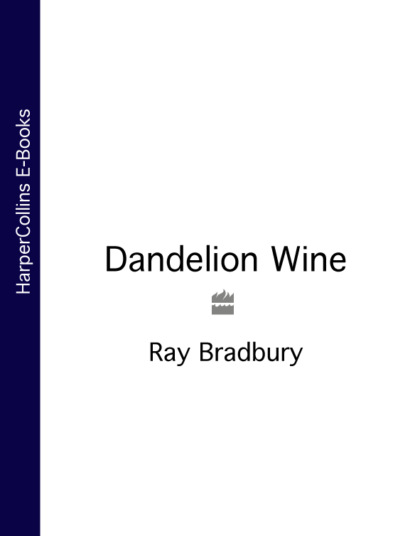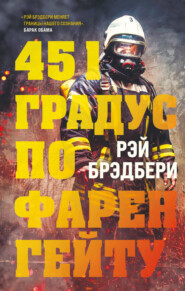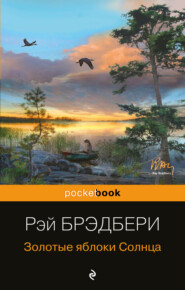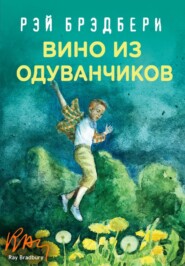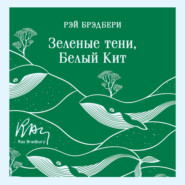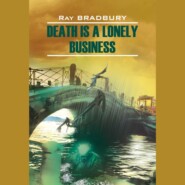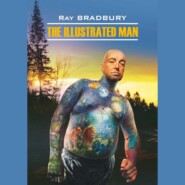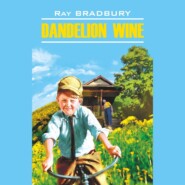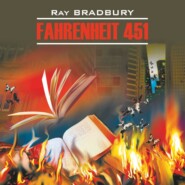По всем вопросам обращайтесь на: info@litportal.ru
(©) 2003-2025.
✖
Dandelion Wine
Автор
Год написания книги
2018
Настройки чтения
Размер шрифта
Высота строк
Поля
At last, like ghosts hovering momentarily behind the door screen, Grandma, Great-grandma, and Mother would appear, and the men would shift, move, and offer seats. The women carried varieties of fans with them, folded newspapers, bamboo whisks, or perfumed kerchiefs, to start the air moving about their faces as they talked.
What they talked of all evening long, no one remembered next day. It wasn’t important to anyone what the adults talked about; it was only important that the sounds came and went over the delicate ferns that bordered the porch on three sides; it was only important that the darkness filled the town like black water being poured over the houses, and that the cigars glowed and that the conversations went on, and on. The female gossip moved out, disturbing the first mosquitoes so they danced in frenzies on the air. The male voices invaded the old house timbers; if you closed your eyes and put your head down against the floorboards you could hear the men’s voices rumbling like a distant, political earthquake, constant, unceasing, rising or falling a pitch.
Douglas sprawled back on the dry porch planks, completely contented and reassured by these voices, which would speak on through eternity, flow in a stream of murmurings over his body, over his closed eyelids, into his drowsy ears, for all time. The rocking chairs sounded like crickets, the crickets sounded like rocking chairs, and the moss-covered rain barrel by the dining-room window produced another generation of mosquitoes to provide a topic of conversation through endless summers ahead.
Sitting on the summer-night porch was so good, so easy and so reassuring that it could never be done away with. These were rituals that were right and lasting; the lighting of pipes, the pale hands that moved knitting needles in the dimness, the eating of foil-wrapped, chilled Eskimo Pies, the coming and going of all the people. For at some time or other during the evening, everyone visited here; the neighbors down the way, the people across the street; Miss Fern and Miss Roberta humming by in their electric runabout, giving Tom or Douglas a ride around the block and then coming up to sit down and fan away the fever in their cheeks; or Mr Jonas, the junkman, having left his horse and wagon hidden in the alley, and ripe to bursting with words, would come up the steps looking as fresh as if his talk had never been said before, and somehow it never had. And last of all, the children, who had been off squinting their way through a last hide-and-seek or kick-the-can, panting, glowing, would sickle quietly back like boomerangs along the soundless lawn, to sink beneath the talking talking talking of the porch voices which would weigh and gentle them down …
Oh, the luxury of lying in the fern night and the grass night and the night of susurrant, slumbrous voices weaving the dark together. The grownups had forgotten he was there, so still, so quiet Douglas lay, noting the plans they were making for his and their own futures. And the voices chanted, drifted, in moonlit clouds of cigarette smoke while the moths, like late appleblossoms come alive, tapped faintly about the far street lights, and the voices moved on into the coming years …
In front of the United Cigar Store this evening the men were gathered to burn dirigibles, sink battleships, blow up dynamite works and, all in all, savor the very bacteria in their porcelain mouths that would someday stop them cold. Clouds of annihilation loomed and blew away in their cigar smoke about a nervous figure who could be seen dimly listening to the sound of shovels and spades and the intonations of ‘ashes to ashes, dust to dust.’ This figure was that of Leo Auffmann, the town jeweler, who, widening his large liquid-dark eyes, at last threw up his childlike hands and cried out in dismay.
‘Stop! In God’s name, get out of that graveyard!’
‘Leo, how right you are,’ said Grandfather Spaulding, passing on his nightly stroll with his grandsons Douglas and Tom. ‘But, Leo, only you can shut these doom-talkers up. Invent something that will make the future brighter, well rounded, infinitely joyous. You’ve invented bicycles, fixed the penny-arcade contraptions, been our town movie projectionist, haven’t you?’
‘Sure,’ said Douglas. ‘Invent us a happiness machine!’
The men laughed.
‘Don’t,’ said Leo Auffmann. ‘How have we used machines so far, to make people cry? Yes! Every time man and the machine look like they will get on all right – boom! Someone adds a cog, airplanes drop bombs on us, cars run us off cliffs. So is the boy wrong to ask? No! No …’
His voice faded as Leo Auffmann moved to the curb to touch his bicycle as if it were an animal.
‘What can I lose?’ he murmured. ‘A little skin off my fingers, a few pounds of metal, some sleep? I’ll do it, so help me!’
‘Leo,’ said Grandfather, ‘we didn’t mean —’
But Leo Auffmann was gone, pedaling off through the warm summer evening, his voice drifting back. ‘… I’ll do it …’
‘You know,’ said Tom, in awe, ‘I bet he will.’
Watching him cycle the brick streets of evening, you could see that Leo Auffmann was a man who coasted along, enjoying the way the thistles ticked in the hot grass when the wind blew like a furnace, or the way the electric power lines sizzled on the rain-wet poles. He was a man who did not suffer but pleasured in sleepless nights of brooding on the great clock of the universe running down or winding itself up, who could tell? But many nights, listening, he decided first one way and then the other …
The shocks of life, he thought, biking along, what were they? Getting born, growing up, growing old, dying. Not much to do about the first. But – the other three?
The wheels of his Happiness Machine spun whirling golden light spokes along the ceiling of his head. A machine, now, to help boys change from peach fuzz to briar bramble, girls from toadstool to nectarine. And in the years when your shadow leaned clear across the land as you lay abed nights with your heartbeat mounting to the billions, his invention must let a man drowse easy in the falling leaves like the boys in autumn who, comfortably strewn in the dry stacks, are content to be a part of the death of the world …
‘Papa!’
His six children, Saul, Marshall, Joseph, Rebecca, Ruth, Naomi, all ages from five to fifteen, came rushing across the lawn to take his bike, each touching him at once.
‘We waited. We got ice cream!’
Moving toward the porch, he could feel his wife’s smile there in the dark.
Five minutes passed in comfortable eating silence, then, holding a spoonful of moon-colored ice cream up as if it were the whole secret of the universe to be tasted carefully he said, ‘Lena? What would you think if I tried to invent a Happiness Machine?’
‘Something’s wrong?’ she asked quickly.
Grandfather walked Douglas and Tom home. Halfway there, Charlie Woodman and John Huff and some other boys rushed by like a swarm of meteors, their gravity so huge they pulled Douglas away from Grandfather and Tom and swept him off toward the ravine.
‘Don’t get lost, son!’
‘I won’t … I won’t …’
The boys plunged into darkness.
Tom and Grandfather walked the rest of the way in silence, except when they turned in at home and Tom said, ‘Boy, a Happiness Machine – hot diggety!’
‘Don’t hold your breath,’ said Grandpa.
The courthouse clock struck eight.
The courthouse clock struck nine and it was getting late and it was really night on this small street in a small town in a big state on a large continent on a planet earth hurtling down the pit of space toward nowhere or somewhere and Tom feeling every mile of the long drop. He sat by the front-door screen looking out at that rushing blackness that looked very innocent, as if it was holding still. Only when you closed your eyes and lay down could you feel the world spinning under your bed and hollowing your ears with a black sea that came in and broke on cliffs that weren’t there.
There was a smell of rain. Mother was ironing and sprinkling water from a corked ketchup bottle over the crackling dry clothes behind Tom.
One store was still open about a block away – Mrs Singer’s.
Finally, just before it was time for Mrs Singer to close her store, Mother relented and told Tom, ‘Run get a pint of ice cream and be sure she packs it tight.’
He asked if he could get a scoop of chocolate on top, because he didn’t like vanilla, and Mother agreed. He clutched the money and ran barefooted over the warm evening cement sidewalk, under the apple and oak trees, toward the store. The town was so quiet and far off you could hear only the crickets sounding in the spaces beyond the hot indigo trees that hold back the stars.
His bare feet slapped the pavement. He crossed the street and found Mrs Singer moving ponderously about her store, singing Yiddish melodies.
‘Pint ice cream?’ she said. ‘Chocolate on top? Yes!’
He watched her fumble the metal top off the ice-cream freezer and manipulate the scoop, packing the cardboard pint chock-full with ‘chocolate on top, yes!’ He gave the money, received the chill, icy pack, and rubbing it across his brow and cheek, laughing, thumped barefootedly homeward. Behind him the lights of the lonely little store blinked out and there was only a street light shimmering on the corner, and the whole city seemed to be going to sleep.
Opening the screen door, he found Mom still ironing. She looked hot and irritated but she smiled just the same.
‘When will Dad be home from lodge meeting?’ he asked.
‘About eleven or eleven-thirty,’ Mother replied. She took the ice cream to the kitchen, divided it. Giving him his special portion of chocolate, she dished out some for herself and the rest was put away, ‘for Douglas and your father when they come.’
They sat enjoying the ice cream, wrapped at the core of the deep quiet summer night. His mother and himself and the night all around their small house on the small street. He licked each spoonful of ice cream thoroughly before digging for another, and Mom put her ironing board away and the hot iron in its open case cooling, and she sat in the armchair by the phonograph, eating her dessert and saying, ‘My land, it was a hot day today. Earth soaks up all the heat and lets it out at night. It’ll be soggy sleeping.’
They both sat listening to the night, pressed down by every window and door and complete silence because the radio needed a new battery, and they had played all the Knickerbocker Quartet records and Al Jolson and Two Black Crows records to exhaustion; so Tom just sat on the hardwood floor and looked out into the dark dark dark, pressing his nose against the screen until the flesh of its tip was molded into small dark squares.
‘I wonder where Doug is? It’s almost nine-thirty.’
‘He’ll be here,’ Tom said, knowing very well that Douglas would be.
He followed Mom out to wash the dishes. Each sound, each rattle of spoon or dish was amplified in the baked evening. Silently they went to the living room, removed the couch cushions and, together, yanked it open and extended it down into the double bed it secretly was. Mother made the bed, punching pillows neatly to flump them up for their heads. Then, as he was unbuttoning his shirt, she said, ‘Wait awhile, Tom.’
‘Why?’
‘Because I say so.’





